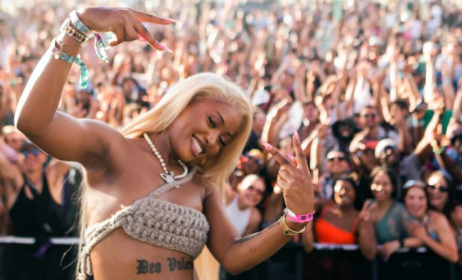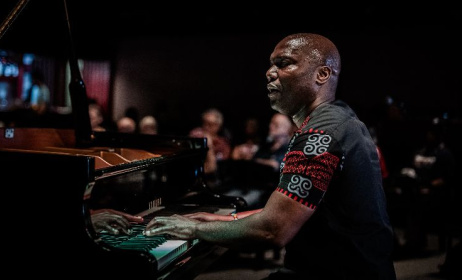Live music in Ivory Coast
By Hermann Zamble
This text provides an overview of the live music scene in Ivory Coast.
 (Ph) www.yoolabox.com
(Ph) www.yoolabox.com
Since gaining independence in 1960, the Republic of Cote D’Ivoire (also known as Ivory Coast) gave priority to boosting the economy, agriculture and health, treating culture as a minor sphere. Yet the country overflows in cultural potential. Be it in the field of theatre, film, sculpture, dance or music, signs of cultural diversity abound. This area appears to bring a key dimension to the development of nations.
Artists and genres
Ivory Coast has many talented artists. Proof of this abounds Alpha Blondy, Magic System, Meiway, Tiken Jah Facoly, etc. Every day one witnesses the rise of new musical concepts, from Zouglou to Coupé-Décalé, and from Zoblazo to Mapouka, just to mention a few. The Ivorian youth does not lack creativity.
At once time, artists such as François Lougah, Amédé Pierre, Zike and others masterfully held the live scene. Many precursors of Ivorian music, such as the Comoé Sisters, Amédé Pierre, Mamadou Doumbia and Allah Thérèse, wrote the name of Ivorian music on the sands of time. But the live scene had its real boom with artists such as Alpha Blondy in 1983 and Ernesto Djedje, who through numerous concerts knew how to activate the scene. The artists at the time played at least one musical instrument. This era was known for orchestras and bands that accompanied artists. Many dance halls allowed artists to express themselves through live performances. Later, artists such as Meiway (who first rose to prominence through the TV shows on RTI devoted to orchestras), Nayanka Bell and more recently Magic System, DJ Arafat and others, were able to further grow the live scene. But it should be noted that today, many concerts are given ‘semi-live’ (with backing tracks).
Today, many artists - such as Alpha Blondy, Tiken Jah Fakoly, John Yallet, Magic System, Espoir 2000, Ismael Isaac Meiway and others - do their best to uphold live music through live/orchestrated music. But it should be noted that currently fewer artists know how to play an instrument.
From Ziglibity (eg.Ernesto Djedje) to Zouglou (eg. Magic system) to Reggae and more recently Coupé Décalé, one notes a proliferation of musical genres in Ivory Coast. Since the 2000s, which saw the advent of Coupé Décalé, it is also noted that genres appear and disappear fairly quickly (such as kpongor, kpankaka, ‘avian flu’ etc). These genres are often associated with the dances that accompany them.
Venues
In Abidjan and its periphery, the Palais des Congress of Hotel Ivoire was once the most notable place in Ivory Coast for live events because of its convenient setting. The Felix Houphouet-Boigny Stadium was also sometimes used for the purpose. But since the creation of the Palais de la Culture in 1999, the majority of live shows are held there. One must not forget the Cultural Center of Abobo, where small events are held. Yopougon’s Allocodrome also serves as a live music venue. One must equally mention a few town halls (for example in Port Bouet, Marcory, Kumasi, etc). Apart from these areas, live music has grown in recent years (since 2000) due to the performance of Zouglou in the maquis (l’Internat, Bolingo, etc.) and in bars, usually on Sundays, and continues to gain ground. Reggae music also joins the list of live music in bars and open spaces, such as Parker Place in Zone 4 in Marcory.
In the countryside, places such as the Bouaké Stadium, San Pedro, and civic centres are used for live music concerts. In Bouake, the Cultural Centre Jacques Acka (currently under construction) hosts many musical performances. Most cities in Ivory Coast have spaces for live performances. It should be noted that in the countryside, many spaces do not always fulfill the requirements for a truly live performance.
The economy of the live music scene
As Felix Houphouet-Boigny, the first President of the Republic of Ivory Coast said: “Our development is a whole that cannot be satisfied with the production of numbers and graphics. The economy cannot be the only measure of a man so it is now essential to give a new dimension to our development, fully incorporating culture.”[i]
This quotation demonstrates the political awareness of the role of culture in the development process. But in reality it still has not been followed by the establishment of real mechanisms to carry forth the cultural sector, in general, and music in particular. The rise of the music industry, despite the difficulties of the development of forms of cultural expression, was arguably made possible by live concerts. The country has therefore been dubbed the “hub of African showbiz” because of its live music scene.
With an established TV and radio (specifically the RTI Group) industry, Ivorian music continues to be promoted on via the media. For example, the programme ‘Show Time’, broadcast on the first national channel, promotes the live music scene. The country has many other radio stations broadcasting on FM - such as Radio Nostalgie, Radio Frequency 2 Jam Radio, Radio ATM, Radio Yopougon, N’Gowa Radio - all working to promote the Ivorian music.
Thousands of people work in this sector. Unfortunately, this creative potential faces enormous challenges due to the precarious professional and social conditions of the actors in the sector in Ivory Coast. The answer comes from a disorganized sector, which also draws its essence from weaknesses in the production, distribution and promotion of music.
Piracy is a plague on the local music industry. When an artist does not know how to sing or perform live concerts, his or her career is already lost. It is through live shows that the artist (or his or her producer) can get a return on investment. Live music is therefore, a necessity for Ivorian artists if they want to live off their art and remain on the scene, thus enriching the economy of the industry.
The cultural industries in general and music in particular, contribute to the enhancement and promotion of cultural identity in Ivory Coast. Because of its importance, if properly exploited, this sector in terms of its evolution in developed countries would occupy a prominent place in economic and social development. Elsewhere in the world, the live music scene is a real driver of growth. A reflection on live music in Ivory Coast will help give it adequate tools for its development. Let us now give a panoramic view of the scene through its history, musical genres, venues, artists and the economic benefits it generates.
The Ivorian music industry has many opportunities. When one looks at it in terms of creativity, one notices an interesting dynamic in terms of the population. The increasing number and variety of rhythms and musical concepts testifies to this. At the promotional level, considerable efforts are being made. It is now up to Ivorian artists, Ivorian authorities and music lovers to foster the growth of the live music scene as a source of economic development and vitality.
[i]HOUPHOUET, B. Felix (1905-1993). Propos sur la culture, 1980, p. 13.





























Comments
Log in or register to post comments